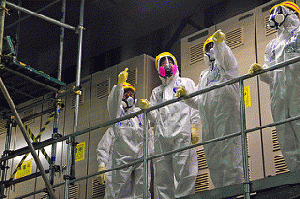reprinted from counterpunch.org
Japan's Abe government claims portions of Fukushima Prefecture (original population 2 million) are safe for habitation, radioactivity is acceptable; whereas scientific data by third-party NGOs indicates otherwise, stay away!
PM Abe's specific maneuvers towards rehabilitation give the appearance that the Fukushima full-blown nuclear meltdown is relatively minimal in comparison to Chernobyl's disastrous explosion of 1986. After all, to this day, Chernobyl after 30 years is still a 30km "exclusion zone" where nobody is allowed due to excessive levels of radiation.
Meanwhile, back in Japan, PM Abe is moving people back into former restricted zones four years after the fact.
It remains an open question as to whether the Fukushima aftermath will be worse than Chernobyl. After all, the China Syndrome may be actively at work at Fukushima and as such could last over many lifetimes.
Still, the immediate direct exposure of radiation over population centers at Chernobyl was significantly more than Fukushima of which 80% drifted out into the Pacific Ocean.
But, that may be slight solace because, horrifyingly, nobody knows where the Fukushima melted cores are located, nobody knows; it's absolutely true, nobody knows whether the molten cores are within the containment vessels, outside of the vessels, deep in the ground, or cataclysmically traversing towards the water table.
Regardless, PM Abe's directive appears to be: "No problem, we've cleaned up a whole lot of the mess outside of the immediate meltdown" so, move back into former restricted areas."
Still, it's nearly impossible to give an all-clear signal at this stage, especially with the Fukushima Daiichi Nuclear Power Station containment vessels completely out of control with wild atom-splitting rogue radionuclides spewing into the Pacific Ocean, and who knows where else (Einstein must be spinning in his grave).
The China Syndrome Worry
"While a molten reactor core wouldn't burn 'all the way through to China' it could enter the soil and water table and cause huge contamination in the crops and drinking water around the power plant. It's a nightmare scenario, the stuff of movies. And it might just have happened at Fukushima," Eben Harrell, Was Fukushima a China Syndrome? Time Magazine, May 16, 2011.
If Chernobyl is a leading indicator of Fukushima's future, "Chernobyl offers many lessons about what Princeton University engineering professor Robert Socolow calls the 'afterheat' of a nuclear disaster, but it's the generational lesson that's most important. Because some of the isotopes released during a nuclear accident remain radioactive for tens of thousands of years, cleanup is the work not just of first responders but also of their descendants and their descendants' descendants. Asked when the reactor site would again become inhabitable, Ihor Gramotkin, director of the Chernobyl power plant, replies, 'At least 20,000 years," Eben Harrell, Apocalypse Today: Visiting Chernobyl, 25 Years Later, Time Magazine, April 26, 2011.
As of June 12th, 2015, the Abe government is returning residents to the Iitate village in Fukushima's Prefecture four short years post the nuclear plant meltdowns, and by the upcoming 2018 year, the prime minister is eliminating state compensation to victims.
Not only that, but since August 2015, PM Abe is reopening nuclear facilities, the Sendai No. 1 reactor has already resumed full-scale commercial operations.
Contrariwise, according to former PM Naoto Kan, who was prime minister during the Fukushima disaster: "I now consider nuclear energy to be the most dangerous form of energy, and the risks associated with it are too great for us to continue generating atomic power," Former Japanese PM Naoto Kan: Fukushima Radically Changed my Perspective, Deutsche Welle, Feb. 25, 2015.
One of the issues in trying to assess the dangers, as well as timing of recovery, for Fukushima is believability. Who can be trusted? In that regard, the Abe government's enactment of strict extraordinarily broad secrecy laws, similar to WWII, with the threat of prison sentences up to 10 years for any violators of indeterminately wide-open secrecy laws undermines confidence in believability of the Japanese government, by definition.
(Note: You can view every article as one long page if you sign up as an Advocate Member, or higher).





